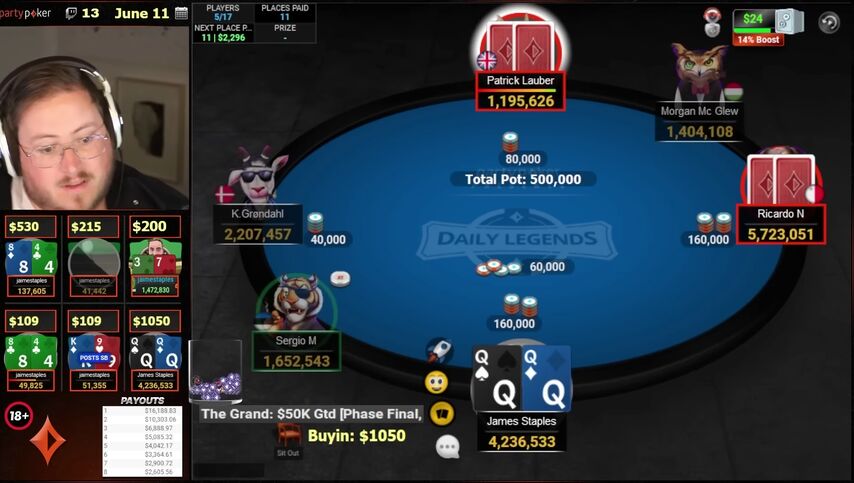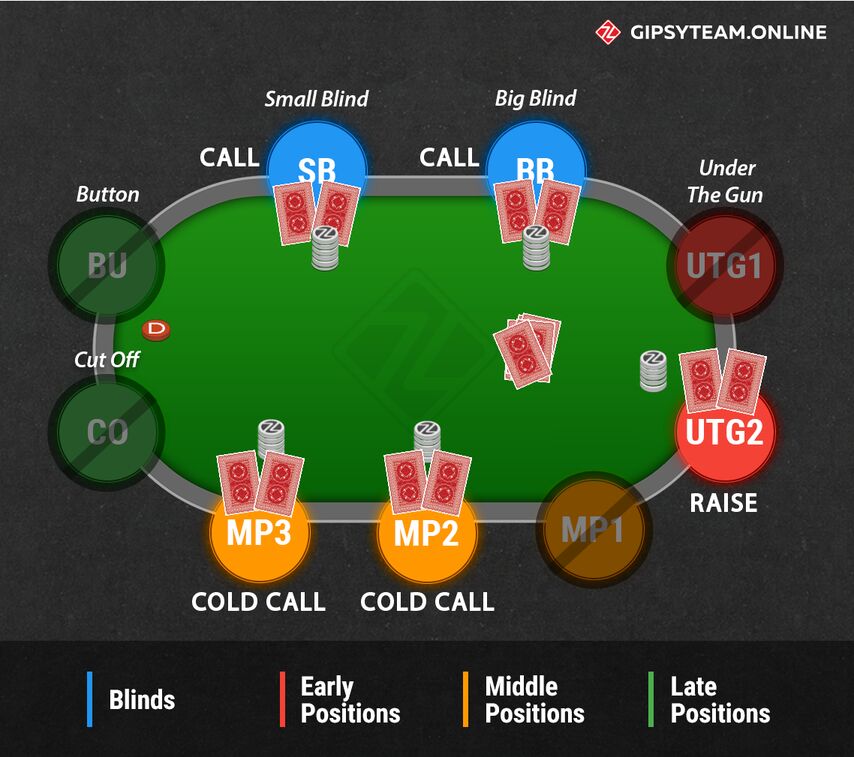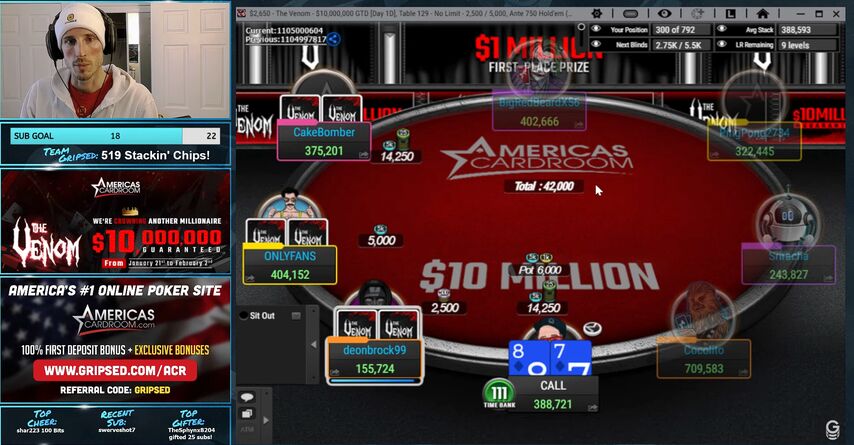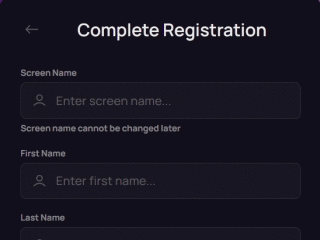Calling in poker is matching the current wager, but what is a cold call in poker?
A cold call is a call after a bet and one or more raises. It does not have the same meaning as “flat call” or “smooth call”, which both mean calling a bet.
There are a few reasons that a player could choose to cold call a raise, rather than re-raise or fold. Experienced players sometimes cold call in the wrong position, with the wrong hands, making it a losing strategy.
In this screenshot below from the partypoker Daily Legends tournament, Jamie Staples cold calls in the hope that he gets re-raised by someone after him.

This short read will explain the advantages and disadvantages of cold calling. By the end, you’ll have a crystal clear understanding of this concept.
Cold Call Definition and Example
You’re playing a game of online poker and everyone has just been dealt cards. One player makes a raise ahead of you. Now it’s your turn, so you slide in some chips to make the call.
Your call is the definition of a cold call. Without any previous investment in the pot, you decided to call the raise. Any of the players who call behind you are also cold-calling.
The players in the small and big blinds are the only ones who cannot cold call. They already have money invested in the hand, meaning it doesn’t qualify as a cold call for them.
Check out this diagram for a clear look at a cold call from multiple players.

It’s important to note that commentators sometimes refer to cold calls as just “calls”. When players are trying to be specific or explain a hand, they’ll be sure to say cold call.
Why Should You Avoid Cold Calling?
Many inexperienced players cold call too often – and that’s a problem.
- Cold calling “caps” your range. When you cold call, you're telling your opponents, “My hand is not strong enough to raise”. It indicates middle-strength range and speculative hands like suited connectors, consecutive cards, and low pocket pairs. All of the hands you might have when you cold call are known as your cold calling range. Of course, you’ll want to occasionally mix strong hands into this range, but not often (because of the next reason).
- Your equity takes a nosedive when you cold call and see a flop with multiple opponents. Let’s imagine you cold call and a few players behind you do the same. Even with a decent hand, it’s very hard to have any sizable advantage when you have 3, 4, or 5 other callers. For this reason, a lot of poker players would rather 3-bet or fold some hands.
- Someone behind you might 3-bet and raise the wager. When you are in an early position, cold calling can leave you vulnerable to a re-raise. If you cold call and there are players still left to act, you could face a re-raise. Remember what we said about the capped range? If you cold call too often, which is common in low-stakes tournaments and cash games, you’ll get raised more often.

Cold calling is a passive play style, which aggressive players will take advantage of. 3-betting in low-stakes online poker games can be a profitable play, although, you won’t be the only savvy player at the table. If you are serious about boosting your win rate, you need to be using a HUD (heads-up display) if your poker site allows it.
We can recommend a few sites that allow HUDs, but you should start with ACR (formerly known as Americas Cardroom). This room is very popular for casual poker players, usually at low-stakes cash games and MTTs (multi-table tournaments).


Why You Should Cold Call [Sometimes]
There are times when cold calling is the correct play to make, especially in poker tournaments.
- You can see a cheap flop. Sometimes, you’re going to want to see a flop with your cold-calling range of mid-strength hands. Imagine a situation where there was a raise and multiple cold callers in front of you. Instead of raising and creating a bloated pot, you might be incentivized to cold call and see a flop.
- You might be able to see a flop in position. When a hand falls into your cold calling range, you should still consider your position. The fewer players behind you that could re-raise, the better. If you know that the players behind you don’t 3-bet very often, that’s even better.
- Weak players behind you can be exploited. Re-raising has benefits, but cold calling could also entice weaker players to enter the pot. If you have a postflop advantage, cold calling can be a good way to build a pot. Experienced players sometimes cold call in tournaments with premium hands, just so that other players will come along.
- Certain tournament situations make cold calling the right play. There are plenty of times during MTTs (multi-table tournaments) when you will want to see a flop, but don’t want to raise and risk many chips. If you suspect that a 3-bet behind you is unlikely, seeing a flop with a mid-strength hand might be the right choice.
You can play real money tournaments, but practicing with freerolls can be a great study tool. Check our freeroll schedule, which we regularly update with new events. The prizes will either be real money or tickets to larger real-money MTTs.
- GipsyTeam's unique promotions
- Help with deposits and cashouts
- Access to private freerolls
- Round-the-clock support
- GipsyTeam's unique promotions
- Help with deposits and cashouts
- Access to private freerolls
- Round-the-clock support
- GipsyTeam's unique promotions
- Help with deposits and cashouts
- Access to private freerolls
- Round-the-clock support
- Уникальные акции от GipsyTeam
- Помощь с депозитами и кешаутами
- Доступ в закрытые фрироллы
- Круглосуточная поддержка
- Уникальные акции от GipsyTeam
- Помощь с депозитами и кешаутами
- Доступ в закрытые фрироллы
- Круглосуточная поддержка
- GipsyTeam's unique promotions
- Help with deposits and cashouts
- Access to private freerolls
- Round-the-clock support
- Уникальные акции от GipsyTeam
- Помощь с депозитами и кешаутами
- Доступ в закрытые фрироллы
- Круглосуточная поддержка
- GipsyTeam's unique promotions
- Help with deposits and cashouts
- Access to private freerolls
- Round-the-clock support
- GipsyTeam's unique promotions
- Help with deposits and cashouts
- Access to private freerolls
- Round-the-clock support
- GipsyTeam's unique promotions
- Help with deposits and cashouts
- Access to private freerolls
- Round-the-clock support
- GipsyTeam's unique promotions
- Help with deposits and cashouts
- Access to private freerolls
- Round-the-clock support
- GipsyTeam's unique promotions
- Help with deposits and cashouts
- Access to private freerolls
- Round-the-clock support
- GipsyTeam's unique promotions
- Help with deposits and cashouts
- Access to private freerolls
- Round-the-clock support
- GipsyTeam's unique promotions
- Help with deposits and cashouts
- Access to private freerolls
- Round-the-clock support
- GipsyTeam's unique promotions
- Help with deposits and cashouts
- Access to private freerolls
- Round-the-clock support
- GipsyTeam's unique promotions
- Help with deposits and cashouts
- Access to private freerolls
- Round-the-clock support
- GipsyTeam's unique promotions
- Help with deposits and cashouts
- Access to private freerolls
- Round-the-clock support
- GipsyTeam's unique promotions
- Help with deposits and cashouts
- Access to private freerolls
- Round-the-clock support
- GipsyTeam's unique promotions
- Help with deposits and cashouts
- Access to private freerolls
- Round-the-clock support
- GipsyTeam's unique promotions
- Help with deposits and cashouts
- Access to private freerolls
- Round-the-clock support
- GipsyTeam's unique promotions
- Help with deposits and cashouts
- Access to private freerolls
- Round-the-clock support
- GipsyTeam's unique promotions
- Help with deposits and cashouts
- Access to private freerolls
- Round-the-clock support
- Уникальные акции от GipsyTeam
- Помощь с депозитами и кешаутами
- Доступ в закрытые фрироллы
- Круглосуточная поддержка
- GipsyTeam's unique promotions
- Help with deposits and cashouts
- Access to private freerolls
- Round-the-clock support
- GipsyTeam's unique promotions
- Help with deposits and cashouts
- Access to private freerolls
- Round-the-clock support
- GipsyTeam's unique promotions
- Help with deposits and cashouts
- Access to private freerolls
- Round-the-clock support
- GipsyTeam's unique promotions
- Help with deposits and cashouts
- Access to private freerolls
- Round-the-clock support
- GipsyTeam's unique promotions
- Help with deposits and cashouts
- Access to private freerolls
- Round-the-clock support
- GipsyTeam's unique promotions
- Help with deposits and cashouts
- Access to private freerolls
- Round-the-clock support
- Уникальные акции от GipsyTeam
- Помощь с депозитами и кешаутами
- Доступ в закрытые фрироллы
- Круглосуточная поддержка
- GipsyTeam's unique promotions
- Help with deposits and cashouts
- Access to private freerolls
- Round-the-clock support
- GipsyTeam's unique promotions
- Help with deposits and cashouts
- Access to private freerolls
- Round-the-clock support
- Уникальные акции от GipsyTeam
- Помощь с депозитами и кешаутами
- Доступ в закрытые фрироллы
- Круглосуточная поддержка
- GipsyTeam's unique promotions
- Help with deposits and cashouts
- Access to private freerolls
- Round-the-clock support
- Уникальные акции от GipsyTeam
- Помощь с депозитами и кешаутами
- Доступ в закрытые фрироллы
- Круглосуточная поддержка
- Уникальные акции от GipsyTeam
- Помощь с депозитами и кешаутами
- Доступ в закрытые фрироллы
- Круглосуточная поддержка
- GipsyTeam's unique promotions
- Help with deposits and cashouts
- Access to private freerolls
- Round-the-clock support
- GipsyTeam's unique promotions
- Help with deposits and cashouts
- Access to private freerolls
- Round-the-clock support
- GipsyTeam's unique promotions
- Help with deposits and cashouts
- Access to private freerolls
- Round-the-clock support
- Уникальные акции от GipsyTeam
- Помощь с депозитами и кешаутами
- Доступ в закрытые фрироллы
- Круглосуточная поддержка
- GipsyTeam's unique promotions
- Help with deposits and cashouts
- Access to private freerolls
- Round-the-clock support
- GipsyTeam's unique promotions
- Help with deposits and cashouts
- Access to private freerolls
- Round-the-clock support
- GipsyTeam's unique promotions
- Help with deposits and cashouts
- Access to private freerolls
- Round-the-clock support
- GipsyTeam's unique promotions
- Help with deposits and cashouts
- Access to private freerolls
- Round-the-clock support
- Уникальные акции от GipsyTeam
- Помощь с депозитами и кешаутами
- Доступ в закрытые фрироллы
- Круглосуточная поддержка
- GipsyTeam's unique promotions
- Help with deposits and cashouts
- Access to private freerolls
- Round-the-clock support
- GipsyTeam's unique promotions
- Help with deposits and cashouts
- Access to private freerolls
- Round-the-clock support























































